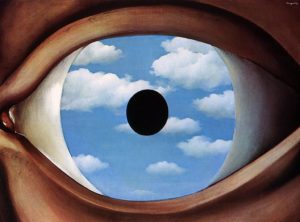Actor-Observer Bias
You are at the casino watching a game of Black Jack, when a player who has a hand of sixteen asks for another card. You quip to yourself “What an idiot! He should have held at 16.” But who’s to say you wouldn’t have done the same? After all, decision making for the self is likely to depend on cues and processes that are not available when judging the choices of others.
Actor/observer asymmetry in risky decision making, Fernandez-Duque & Wifall, 2007

The False Mirror | René Magritte | 1928
Actor-observer bias states that actors tend to attribute the causes of their behavior to stimuli inherent in the situation, while observers tend to attribute behavior to stable dispositions of the actor (Jones and Nisbett, 1972). In other words, actors tend to attribute behavior to external factors whereas observers tend to attribute it to internal factors. The bias was first introduced in the works of Fritz Heider, back in the 50s.
Here, the actor is the person delivering an act, while the observer refers to the person who is -quite obviously- observing the act. For instance, if Marilyn is shouting out of anger at someone, and Jane is watching this situation, then, Marilyn is the actor and Jane would be in the observer position.

Put simply, we tend to relate the failures of an actor to internal conditions like his or her own shortcomings, while if we are put in the very same scenario, we would probably attribute failures to the external conditions such as the society or faults of others.
A great example of this asymmetry can be seen in driving. If you see a driver who is driving recklessly, you will assume that he is a terrible driver. In contrast, and if we are the ones driving recklessly and someone is honking at us, we think we have satisfying reasons as to why we are driving carelessly at the moment, and may even blame them for his impatience.
Also watch
Further reading
Actor/observer asymmetry in risky decision making
Actor–Observer Asymmetries in Explanations of Behavior: New Answers to an Old Question
Which Behaviors Do People Explain? A Basic Actor- Observer Asymmetry
A Brilliant Explanation of the Actor-observer Bias in Psychology
Actor-Observer Bias in Social Psychology
Actor-Observer Bias: Why We Blame Other People Instead of Ourselves
